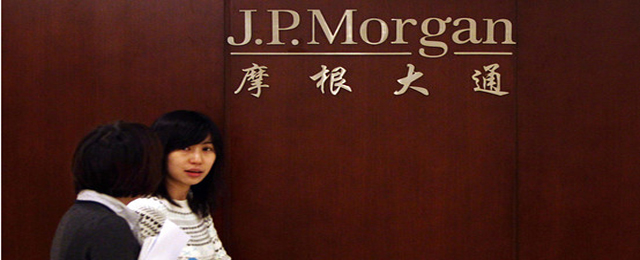The jig is up. The U.S. Securities and Exchange Commission and the U.S. attorney’s office in Brooklyn, N.Y., are looking into $75,000 per month that JPMorgan Chase paid to a two-person consulting firm in China from 2006 to 2008.
According to The New York Times, JPMorgan hired the firm run by a 32-year-old executive named Lily Chang to promote its standing in China
On the surface, Ms. Chang lacked the influence and public name recognition needed to unlock business for the bank, said the Times. But what was known to JPMorgan executives in Hong Kong, and some executives at other major companies, was that “Lily Chang” was not her real name. It was an alias for Wen Ruchun, the only daughter of Wen Jiabao, who at the time was China’s prime minister, with oversight of the economy and its financial institutions.
U.S. officials are scrutinizing JP Morgan’s relationship to Wen Ruchun, as part of a wider bribery investigation focused on “whether the bank swapped contracts and jobs for business deals with state-owned Chinese companies.”
The bank, which is cooperating with the inquiries and conducting its own internal review, has not been accused of any wrongdoing, said the Times.
Wen left office in March under a cloud of suspicion amid scandal that his family allegedly made an astonishing fortune during his time in power.
An investigative report from the Times last year showed that Wen’s family controlled assets worth $2.7 billion.
A separate investigation by Bloomberg/Businessweek around the same time said Xi Jinping, then China’s vice president and now president, and his family had accumulated a fortune valued at hundreds of millions of dollars through investments in multiple, secret holding companies.
Neither Wen or Xi are under any official investigation in China. (That said, The New York Times and Bloomberg are both blocked in China as a direct result of their reporting.)
After taking power earlier this year, President Xi Jinping launched a high-profile anti-corruption campaign, vowing to catch both tigers and flies—big and small corrupt officials, CNN wrote recently. China has seen plenty of such campaigns, arising and subsiding like summer storms.
Whether Wang Qishan, China’s corruption tsar, takes action against Wen remains to be seen. He may have his hands full with the take-down of high-ranking ex-security chief and former Politburo Standing Committee member, Zhou Yongkang, currently under house arrest for “serious disciplinary violations,” CPC-speak for the word corruption.
Wang, as luck would have it, also served as vice premier in charge of economic and financial affairs under Wen from 2008 to 2013.
Nonetheless, Wen Ruchun’s sweet deal with JPMorgan is a reminder of how the sons and daughters of elite communist families live on easy street.
Whether serendipitously employed by a state-owned enterprise or a foreign entity, the lifestyle of the privileged elite is legendary, with conspicuous consumption and in-your-face opulence more common than not. Exotic cars, exclusive designer clothes, extravagant watches and piles of cash are just some of the trappings. (Read more about being the kid of Chinese government official here.)
For the record, the net worth of the 70 richest delegates in China’s National People’s Congress in 2011 was $89.8 billion, compared to the $7.5 billion net worth of all 660 top officials in the three branches of the U.S. government.
Austerity and anti-corruption programs notwithstanding, the People’s Bank of China estimates that 18,000 Communist Party and government officials, public-security members, judicial cadres, agents of state institutions and senior-management individuals of state-owned enterprises have fled China since 1990 with the astronomical sum of US$120 billion.






Be the first to comment on "Bombshell: JPMorgan Secretly Paid Daughter of China’s Ex-Premier $1.8 Million"